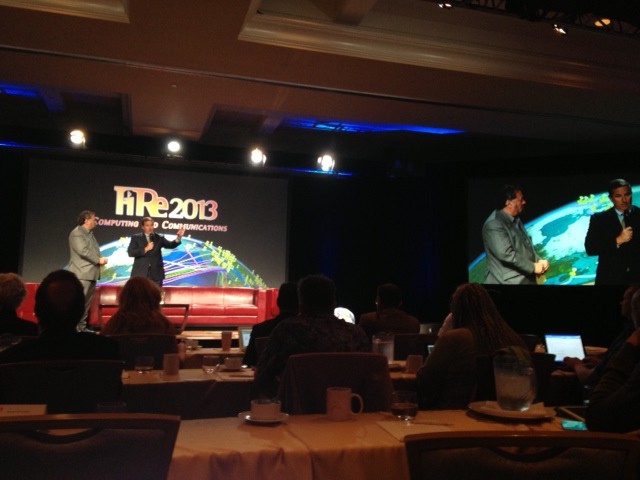The 2013 Signature Mark Hurd-Mark Anderson Standing Interview
With Mark Hurd, President, Oracle; hosted by Mark Anderson.
62,000 use Oracle’s platform
Massive data: How does Oracle play?
- “There’s more data than there was yesterday.” Statistics and physical limits make us confused.
- 6 billion cell phones, 9 billlion internet enabled devices. That will change to about 50 billion as inanimate objects are enabled with sensors. A new set of data will be created by machines. A lot of this will be worthless.
- Pearls in data: If you find them, this can make a huge difference in how you run things. ie. Rigs have tons of sensors. More than likely that data’s worthless, unless you find a drill bit at the bottom of the ocean that prevents an explosion.
- Cloud business is well in excess of $1 billion, but don’t need too many data centers because tech is very efficient.
- Bigger problem is localization of data: We have to have data centers in most of the countries they compete in.
- Analytics: More and more apps will try to align analytics with operations that allow you to make decisions, realign processes.
- There are some regulatory issues about keeping data. “I want to make sure … I’m a big fan of the government.”
- Compression is key: Most Oracle customers are growing data at 40% annually; big banks are all sitting on about 100 petabytes of data. Most customers spend about $8,000 per terabyte. If you collect your data and store it, you’ll write a check for $320 million just to store that.
- Oracle can now shrink data by a factor of 10
- Regulatory pressures, analytic pressures, multiple new listening posts. The pressure is real. You’re going to have to keep that data, it’s just a matter of shrinking it.
- The industry does not have a processing problem: Most servers are about 27% utilized. The latency is in the spread of the data and the movement of data to its processing point, not in the speed of the processors. Datas’ grown 40%, but storage companies aren’t growing.
On customer service and competitiveness
- Innovations are going to have to come on the customer side more than anywhere else: The customer base is shifting younger and the new customer base expects far better customer service. The pressure on companies is going to be huge.
- Phones: Based on the approach that you take and how you deal with the consumer, there are companies who will go out of business and companies that will be formed.
- Hurd’s wife has a personal shopper and they know when she goes on the website and they can chat online.
- Customer service warts will be exposed very quickly.
- Oracle’s social media: Most of what we think about is how to embed social into applications so that Oracle’s customers can communicate seamlessly with their customers. Objective is to bind disparate customer experiences together.
- Still a product company, but more of their work is to vertically integrate these experiences. “Long run, customers want more solutions and less products.”
- You’ve got to get the IT industry doing more work for the customer so that they can spend more on innovation.
- Oracle will do storage whatever way you want it. “This discussion on the delivery architecture is almost sort of silly.” The better conversation is, “How is this optimal for you?”
- Oracle has solved the Amazon outage problem. “No down time is tolerable down time.” Commit that you will get 5 minute resolution on any SR that you see. If for some reason you can’t, Oracle commits to have a developer looking at your problem within 15 min.
- “There are different tolerance levels at the consumer level versus at the company level.”
On Security
- “We typically think of security from the inside out.”
- Most security issues are internal — a disgruntled employee in their cubicle. What do you do about that?
- Can segregate duties and compartmentalize databases
- It’s as much a company policy problem as a technology problem
- “The bad guy is always innovating.” What we’re trying to do is stay on the cutting edge of securities.
- Phones are a fundamentally insecure device, but you can compartmentalize within apps.
On Java
- Roughly 3 billion Java users on the planet, 9 million developers, 1 billion Java downloads this year.
- “We’ve got bad guys and we’re chasing them.” “It’s not going away.” The more popular the platform, the more attacks you’re going to get.
- Dedicated team on this; they’re going to keep at it.
- “There’s nothing worse for us than a breach.”
On hardware
- “We don’t think of it just as hardware. We think of it as high intellectual property that we can integrate the hardware and software together.”
- Can put databases on a chip, which speeds up database calls immensely
- Customers are religious about chips, but are willing to relinquish control when it’s cloud to enable manageability.
- We have to get the cost our of storage.
- Don’t think we’re going to see a big company give multiple cloud vendors separate deals. Private vs. public cloud will be “a very blurry line that probably isn’t worth worrying about.”
- People will do a lot in the name of simplification; that may mean fewer cloud players
- It’s still going to be about how to get the best IP and the best experience for customers.
